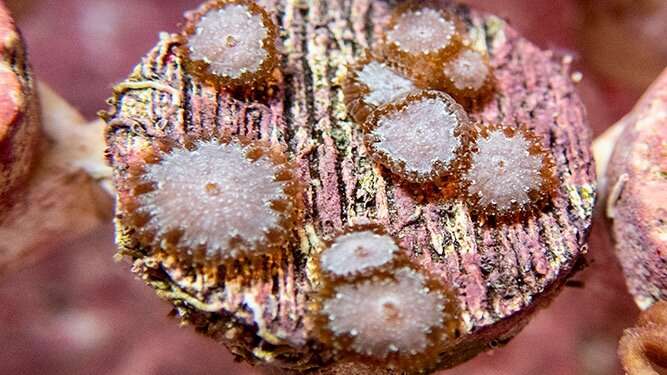Baby corals are just as susceptible as adults to deadly reef disease, study finds

Baby corals are just as susceptible as adults to a deadly disease that has been spreading across Florida’s reefs since 2014, according to a new study led by scientists at the University of Miami (UM) Rosenstiel School of Marine and Atmospheric Science. The findings showed that stony coral tissue loss disease (SCTLD) infects baby corals with similar severity and mortality that we see in adult colonies. This is the first study to show the impacts of any coral disease on baby corals.
“Since baby corals have not been included in surveys of the disease on Florida’s reefs, we have likely underestimated the extent of mortality caused by this disease,” said the study’s lead author Olivia (Liv) Williamson, a Ph.D. candidate in the Department of Marine Biology and Ecology at the UM Rosenstiel School. “That’s like trying to understand how COVID-19 spreads through a population by examining only adults, without looking at whether and how the disease affects children.”
To conduct the study, the scientists exposed lab-raised juveniles of two species of brain corals, four-month-old boulder brain coral (Colpophyllia natans) and eight-month-old grooved brain coral (Diploria labyrinthiformis), to water containing colonies with active SCTLD for four weeks. Both species began to develop lesions within 48 hours after exposure.
During the first exposure, roughly 60 percent of the boulder brain coral babies lost all tissue and died within two to eight days of developing lesions. In contrast, 38 percent of the disease-exposed grooved brain coral babies exhibited active disease lesions during the same period and only one death occurred.
They also found that larger babies, and babies clustered together into groups, were significantly less likely to become diseased and die than smaller and solitary babies.
“There is a ray of hope in that size matters, and there is safety in numbers,” said Williamson. “Since some of them avoided becoming infected at all, it suggests that some corals harbor a degree of resistance—or are at least relatively less susceptible—to disease.”
After 20 days, the researchers conducted a second exposure to further test resistance in the remaining coral babies, and all died within six days.
The research is an important warning to coral restoration practitioners about the risk of SCTLD in baby corals that they grow and outplant, but also suggests that this risk can be reduced by growing coral recruits larger and promote grouping before outplanting.
Juvenile corals are equally or more susceptible to SCTLD than adult colonies, suggesting that the extent of mortality caused on reefs by SCTLD has been underestimated due to the lack of data on coral recruits.
The research team plans to conduct further laboratory experiments to investigate sources of resistance, with the goal of helping to breed and raise baby corals that will not readily succumb to this disease.
Since first appearing in waters off Miami in 2014, stony coral tissue loss disease has now spread throughout all of Florida’s coral reefs as well as the wider Caribbean, affecting over 20 coral species and killing millions of coral colonies. The deadly disease causes white lesions and rapid tissue loss to reef-building corals and the cause has not yet been identified.
The study appears in Frontiers in Marine Science, and authors include Olivia Williamson, Carly Dennison and Andrew Baker from the UM Rosenstiel School, and Keri O’Neil from The Florida Aquarium.
Sediments a likely culprit in spread of deadly disease on Florida coral reefs, study finds
Olivia M. Williamson et al, Susceptibility of Caribbean Brain Coral Recruits to Stony Coral Tissue Loss Disease (SCTLD), Frontiers in Marine Science (2022). DOI: 10.3389/fmars.2022.821165
Citation:
Baby corals are just as susceptible as adults to deadly reef disease, study finds (2022, May 4)
retrieved 4 May 2022
from https://phys.org/news/2022-05-baby-corals-susceptible-adults-deadly.html
This document is subject to copyright. Apart from any fair dealing for the purpose of private study or research, no
part may be reproduced without the written permission. The content is provided for information purposes only.
For all the latest Science News Click Here
For the latest news and updates, follow us on Google News.

